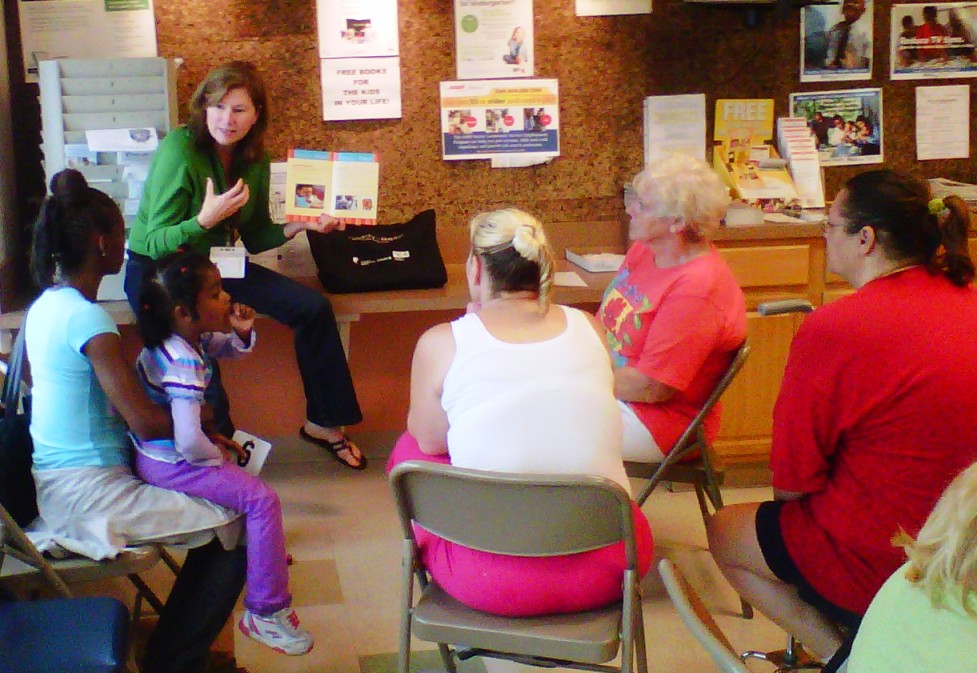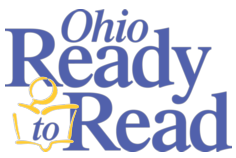There are many ways to share early literacy information with parents and caregivers! You can talk about these concepts in storytime, during day-to-day interactions at the children's desk and in the stacks, and anytime you interact with parents and caregivers. You can share early literacy information via signage, displays, social media, and library publications. Some ideas:

- Schedule an ORTR Early Literacy 101 training for your staff, to equip them to share early literacy concepts.
- Learn about new research, articles, parent tips, and more on ORTR's Facebook page.
- Curious about how to include early literacy messaging in storytime? See our Storytime Ideas page for lots of helpful resources!
- Consider partnering with other organizations that support families and children. Find suggestions in the Partnerships section.
Resources to Share with Parents and Caregivers
Help parents to thrive as their children's first and best teachers. Browse these websites for talking points, downloadables, and good ideas to share with parents, or link to these sites on your parent-oriented handouts, website, or social media:
Day By Day Ohio Family Literacy Calendar
A perpetual calendar for young children and their families, featuring a song, a video, activities, and book recommendations for every day of the year! DayByDayOH, a service of the State Library of Ohio in collaboration with Ohio Ready to Read, also includes literacy and health information and an Ohio public library locator map.
Dolly Parton's Imagination Library of Ohio
Dolly Parton's Imagination Library of Ohio provides young children a free book every month from birth to age five. Families in any Ohio county may enroll their young children in this program as early as birth. This opportunity is FREE for families. The Imagination Library is reaching children in all 88 counties thanks to the support of Ohio's public libraries and other early childhood literacy partners.
Reading Tips for Families
Reading definitions, activities, and resources to engage and educate families, while meeting requirements for disability accessibility and accessibility for non-English speakers. The site's glossary of educational terms is especially helpful for parents and guardians, and is a good tool for librarians to know about!
Zero to Three
Resources for parents and others to learn about brain development, early language and literacy, and child development. The site includes family-focused information, tools, and tips on many everyday topics including grandparents as caregivers and can also be searched for state-specific resources.
Embrace Race: Supporting Healthy Racial Learning in Early Childhood
Early childhood is the critical time in the development of children's ideas and attitudes about race. Adults who engage children explicitly in thoughtful, informed, and age-appropriate ways ensure they grow up racially healthy. This resource guide from EmbraceRace will help.
Learn the Signs. Act Early.
The Centers for Disease Control and Prevention offers many resources about healthy early childhood development for parents and guardians. A wide variety of free materials including checklists, tip sheets, growth charts, books, and more are available for download here. Some of these resources are tailored toward families and some toward professionals.
Why Is Early Childhood So Important?
In the first few years of life, more than one million neural connections are formed each second – a pace never repeated again. The quality of a child’s early experiences makes a critical difference as their brains develop, providing either strong or weak foundations for learning, health, and behavior throughout life. Explore topics related to early childhood learning and development from UNICEF.
PBS: Born to Learn
This 55-minute documentary produced by PBS station KSPS covers early brain development including brain growth, social interactions, serve & return, stress and self-regulation, executive function, and much more. It is research-based and layperson-accessible, and is available to stream at this link.
Reading Rockets: Literacy at Home
Tools, tips, booklists, and other free resources for families from Reading Rockets, a national multimedia literacy initiative offering information and support on how young kids learn to read, why so many struggle, and how caring adults can help.
Reading Rockets: Dialogic Reading
This powerful, fun method of reading interactively with children turns books into opportunities for conversation and learning. In dialogic reading, the adult helps the child become the teller of the story. Dialogic reading significantly enhances early literacy skill-building. It also encourages social skills such as taking turns and listening; gives children practice in sorting and communicating their thoughts; and helps children understand that their input is important and meaningful.
PBS Parents: Literacy
Parents and caregivers can learn about reading, writing, speaking, and listening skills at every age from 2-8, explore how children become readers and writers, and discover ways to help them develop by talking, reading, and writing together every day.
